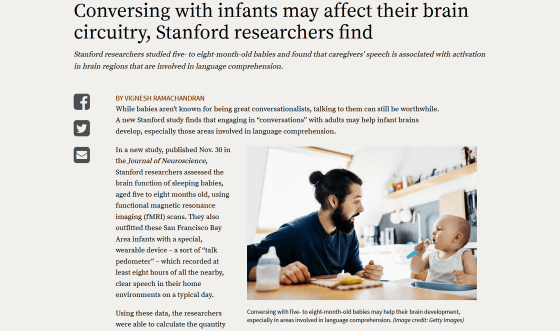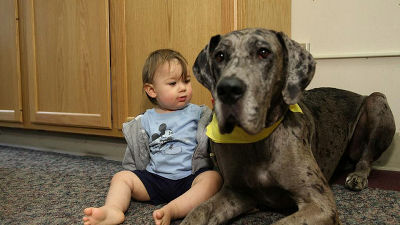Talking to a non-speaking baby turns out to change the circuit of the brain

It is said that children first begin to speak words around the first year of life, and babies before that make meaningless voices such as 'ah' and 'uh'. A conversation with an adult cannot be established when it is not possible to speak yet, but a research team at Stanford University said, 'Even if the conversation is not established, the baby's brain circuit changes when the adult speaks.' I announced the research result.
Naturalistic Language Input is Associated with Resting-State Functional Connectivity in Infancy | Journal of Neuroscience
Conversing with infants may affect their brain circuits | Stanford News
https://news.stanford.edu/2020/11/30/conversing-infants-may-affect-brain-circuitry/

There is no meaning the baby emits voice such as 'uh' and 'Wu' is babbling (South Lake) has been called, although it is possible to pump out the somehow emotion in facial expressions and tone of voice, conversation rich in others and variations It is impossible to do. However, just because you can't talk, you can't conclude that it's meaningless to talk to your baby.
So a research team at Stanford University decided to investigate the effects of talking to these babies on their development. First, the research team installed 99 babies aged 5 to 8 months with a 'wearable device that measures the amount of conversation', and for at least 8 hours of 'clear conversations that took place nearby' for all babies. Was recorded.
Based on this data, the research team measured how much each baby participated in 'conversations with surrounding adults' in daily life. Infants of this age are unable to engage in complex conversations, but can respond aloud when spoken to by an adult, or to elicit some reaction from an adult.

Subsequently, 51 of the infants who completed the measurement of conversation volume were scanned by fMRI to measure oxygen consumption in the brain and detect brain activity. It is generally considered difficult to scan the baby's brain because the baby cannot follow instructions such as 'stay still' during the scan.
Therefore, the research team decided to use the method of 'sleeping the baby and scanning the brain.' To help the baby sleep better, the brain scan was performed near the baby's bedtime to help the baby sleep near the facility where the mother scans. 'When we started this study, no one at Stanford University scanned the baby's brain for the study, so we set up all the steps,' said study co-author Professor Ian Gotlib. I had to do it. '
Among the brain scan data obtained from infants, the research team focused on 'functional connectivity in the brain region of the temporal lobe , which is associated with language comprehension.' As a result, it was found that 'infants who participate in more conversations in their daily lives have less synchronized activation in the neural network of the area that processes language stimuli.'
Lucy King , Ph.D. student at Stanford University, the lead author of the treatise, found in this study whether increased conversational volume and decreased functional connectivity in the temporal lobe are good or bad for babies. Pointed out that it has not become. 'I don't know for sure, but we speculate that the less connected, the more efficient the brain tissue is,' he said.

The decrease in functional connectivity in the temporal lobe was confirmed only in 'babies who had direct conversations with adults' and not in 'babies who heard other adults talking'. 'Our findings show that conversation is important for brain function even in pre-speaking babies,' said King. 'It's a special effect not only to hear the conversation, but to actually have a conversation.' Suggests that you have.
On the other hand, the research team pointed out that further research is needed to understand the relationship between changes in brain function in infants and later language development. Parents and babies who participated in this study are followed up to find out about empathy for others, social relationships, vocabulary, and psychopathological signs.
'As a society, we must help our parents have the time and resources to engage in rich interactions with their babies,' said King. The research team hopes that this discovery will help create future policies and institutions that will help families.

Related Posts:
in Science, Posted by log1h_ik







